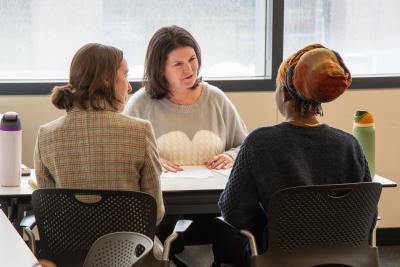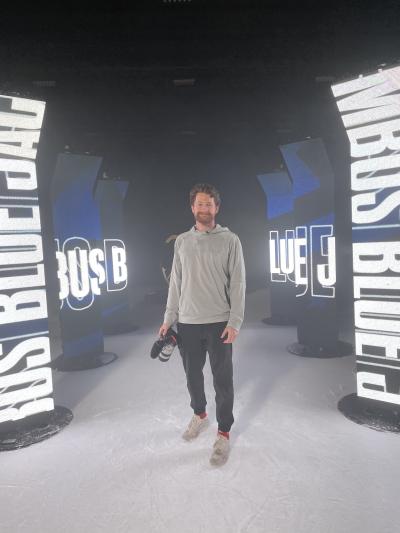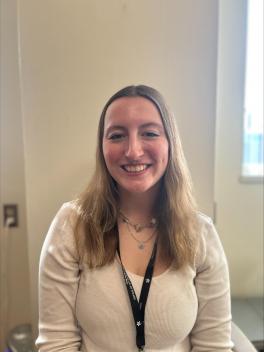Career Courses, Internship Credit
Explore the sections below to learn about applying for and receiving credit for your departmental internships, as well as our career courses and career design courses!

The College of Arts and Sciences Center for Career and Professional Success is pleased to offer our career development courses designed to help students map out career plans, prepare for internships, build professional skills, and work directly with industry and alumni partners. Our courses provide practical, actionable skills that translate directly to workplace success for our graduates. To learn more, contact Assistant Dean Tricia Zelaya-Leon.1@osu.edu for more information.
ARTSSCI 2000: Designing Your Career Experience
- Credits: 1
- Instructors: Nathan Titkemeier
- Day: Mondays and Wednesdays (Second-half term course)
- Time: 4:10 – 5:05 pm
- Location: Dulles 30
- Enrollment Cap: 25 (Open to 1st, 2nd, and 3rd-year students.)
Are you unsure about whether an internship is right for you? Do you know how to find career-building opportunities (like internships) that align with your values and goals? Are you considering graduate school, but not sure how to prepare? This course provides you with practical tools, resources, and strategies to get the most out of any career-building opportunity.
ARTSSCI 3000: Designing Your Life After College
- Credits: 2
- Instructors: David Barnes & Allison Adkins
- Days: Mondays, Wednesdays
- Time: 3:00 – 3:55 pm
- Location: Jennings 136
- Enrollment Cap: 25 (Open to 2nd, 3rd and 4th-year students.)
Could you use help creating a thoughtful career plan? This course connects you directly with career resources, tools, and mentors, and helps you identify the skills or experiences you need to be competitive in the world of work. You will complete a micro-internship, industry-specific course, or certification that will give you the competitive edge you need to break into your field of interest.
ARTSSCI 4000: Designing Your Career Launch
- Credits: 2
- Instructors: Scott Kustis & Barbara Harvey
- Days: Tuesdays, Thursdays
- Time: 4:10 – 5:05 pm
- Location: Derby 049
- Enrollment Cap: 25 (Seniors only.)
This course prepares you for your post-graduate career by offering real-world experience while still in college. You’ll work directly with industry partners to develop solutions to real challenges, building employer confidence in your professional potential. By the end, you'll have a comprehensive industry project to showcase on your resume, cover letter, and in interviews. If you've taken other career development courses, this one will push you further by refining your career materials with insights from mentors, faculty, and peers. The instructor will tailor content to your career journey, with alternative assignments available as needed.
If you are an employer interested in working with our ARTSSCI 4000 students on their Capstone Project, click here to learn more.
Please note that all Career Success courses count as electives. Be sure to consult with your advisor to understand how this may affect your enrollment and graduation plans.
ASC DEPARTMENT INTERNSHIP COURSES
Unsure about whether your department offers internship course credit? Check out the document below for a complete list of Arts and Sciences departments that offer internship courses.
ASC CCPS Internship Courses Semesters Updated09 2024
To earn academic credit, you will need to complete assignments specified by the department and work for a minimum number of hours at the internship site. Students register and pay tuition for these credit hours in the same manner as other classroom learning experiences.
When seeking credit for an internship, you should plan to:
- Provide the department contact with a copy of the internship description.
- Contact the department about the possibility of obtaining credit BEFORE you begin the internship (the general guideline is to request credit at least two weeks before the term starts).
A word of caution: Internship postings published by companies sometimes include statements like, "school credit is available." You need to know that the decision about whether or not a particular internship is worthy of academic credit resides with the university’s academic departments – not the companies that recruit students. If you are denied enrollment in a department internship course, you might be able to obtain approval to enroll in one of the college-level internship courses.
INTERNSHIP COURSES OPEN TO ALL ASC MAJORS
You are encouraged to first check with an academic department to see if the particular internship you are considering meets their requirements for obtaining academic credit. If course credit is not available from an academic department, you can enroll in either ARTSSCI 1191 or ARTSSCI 3191.02 as long as:
- The internship has first been approved by the Center for Career and Professional Success,
- You are seeking to enroll BEFORE the “last day to add a course without a petition” deadline, and
- You have a minimum cumulative GPA of 2.0.
Because of the time required to review enrollment requests, you are strongly encouraged to submit your enrollment request form no later than a week prior to the start of the semester or session. Please note that the ARTSSCI internship courses are subject to the same late enrollment fees as “regular courses”. Enrollment in the ARTSSCI internship courses is based on location of internship. If you will be working on-site for an employer located in another state, you will be charged out-of-state tuition and fees. If you are doing 100% virtual work for an employer located in another state, you will not be charged out-of-state tuition and fees.
The main difference between ARTSSCI 1191 and ARTSSCI 3191.02 is the credits offered via the courses. The 1191 course is a zero-credit course that provides a transcript notation for your internship. This course is a good option if the internship site requires you to be enrolled during your internship. The 3191.02 course can be taken for 1 or 2 credit hours based on how many hours you’ll be working at your internship site, and it includes career exploration assignments. Both courses are taught 100% online via Carmen.
After an enrollment request form is submitted, Career Success will contact your internship site supervisor to verify the information you provided on the enrollment request form. Once the form is confirmed as accurate, Career Success will directly enroll you into the course and email you about your enrollment status.
Students must find an internship before enrolling. An internship will NOT be arranged for students as part of this course. Students should begin searching for an internship during the middle portion of the term prior to their intended enrolling. For example, if you plan to enroll in the course for Spring Semester you will need to begin your internship search during the middle portion of Autumn Semester.
Internship opportunities geared toward Arts and Sciences majors are found in Handshake.
Before enrolling in one of the ARTSSCI internship courses, an international student must have a Curricular Practical Training (CPT) form on file with the Office of International Affairs (OIA). International students can learn more about CPT here.
Internship Success Stories

I completed my internship with the Columbus Blue Jackets, a team that is a part of the National Hockey League.
I had the unique opportunity to be a part of the digital media internship with the CBJ team during the summer, and while working with the digital team, I was able to network and meet other staff in different departments. I formed a close connection with some of the staff on the video team, and they offered me the Video Production internship for the 2024-2025 season in order to continue to grow my video skills and experience.
During my time with the Blue Jackets, I had many responsibilities. The main one was filming game content for social use and other video content forms throughout the season. Another was being given certain tasks or projects to assist with corporate events and other partnerships. On days with no games, I would attend meetings and see how the video team was organized and structured behind the scenes and what went into all the video projects.
Since getting my Bachelor’s degree, I have been on and off debating whether or not to get my master’s degree. I am currently pursuing my Master’s as an option. If the skills I have acquired from this internship and my previous experiences help me land a full-time job then I will accept a position instead of returning to school. So far I have been incredibly thankful for where my experiences have led me and I am glad I pursued the academic path I did.
I realized how many options there are out there for me. With more and more skills I am learning I see more routes and options opening up which has been beneficial in keeping me positive for my future.
Skills in videography and video editing were definitely the main focus of my internship. But also time management, project management, and other creative aspects were learned to help me in this field I am pursuing.
So far my favorite part of this internship has been all the people I have met. Working with a professional sports team there are all kinds of people that help create the environment we all know and love that comes from a sports event. I have had the privilege to work with so many caring and talented people who have also supported me and the things that I have worked on.
Keep going, keep creating, and never stop doing things you are passionate about. There are different times for everyone and no matter what age you are your next great opportunity could be waiting right around the corner.
My path has been far from normal, I hope people see this and believe that it does not matter where or when you start a career in the creative field but that everyone is welcome and it is my goal to help make this field a better one by continuing to support those that are new.
— Gabe Haferman, BA ’22, Strategic Communications

I am currently interning in a 100% virtual role through Nationwide Children’s Hospital. I discovered this opportunity through a friend in my major, who connected me with my psychologist supervisor, Dr. Eileen Chaves.
In my role, I assist Dr. Chaves with her research in Pediatric Weight Loss and Eating Disorder treatment. Our current projects include a multi-site study on the Retention of Black Patients in Pediatric Weight Loss Programs and a new retrospective study on predictors for eating disorders. My responsibilities involve writing Institutional Review Board (IRB) submissions and coordinating with the IRB committee to ensure compliance with research standards. Additionally, I participate in meetings with study staff, which provides an incredible opportunity to collaborate with doctors, psychologists, and students from across the country! Soon, I will also receive training in qualitative data analysis, allowing me to apply the knowledge I’ve gained in my psychology research classes to real-world research analysis.
This experience has not only solidified my passion for research but also deepened my appreciation for collaboration and mentorship. Working with experienced psychologists and doctors has taught me that you can integrate advocacy and your passions into research and that you can always expand the bounds of your knowledge.
For students seeking internships, my advice is to be proactive. Reach out to professors, friends, and advisors for leads, and explore hospital websites for research assistant or internship positions. Once you identify opportunities, don't hesitate to email doctors to inquire about internships, it can open doors you may not expect!
Overall, gaining hands-on experience in your field of interest is a great way to gauge whether or not you can see yourself working in that field for your career. It can also expand your field of interest and allow you to work with diverse populations you may have never worked with before. Having a mentor who has experience in the field and can answer your questions will provide you with invaluable wisdom which will surely help you in your future career pursuits!
I am incredibly grateful for this opportunity and look forward to continuing my research and studies in psychology and medicine!
— Simone Sears, BA ’26, Psychology (Pre-Medicine Track)

I completed my internship at the Child Brain and Development Lab led by Dr. H. Gerry Taylor. I learned about this opportunity simply by searching for labs that aligned with my interests in child development and neuroscience. And this lab aligned perfectly with my interests! During my internship, I assisted with data entry and interview transcription. This experience had a significant impact on my academic journey, as it allowed me to develop a deeper appreciation for the research process and its role in advancing knowledge about child development. This internship has also enhanced both my technical and organizational abilities, which I continue to apply in my academic work. My favorite aspect of my internship was the opportunity to contribute to research that has real-world implications for understanding and improving outcomes in children. It’s really fulfilling knowing that my work played a small but important role in contributing to meaningful research. For students interested in pursuing internships in this field, my advice is to take the initiative to seek out opportunities. Even if you don’t have prior experience, showing a willingness to learn can really open doors. You should also be open to different types of roles in labs. Tasks like transcription and fact-checking may seem minor, but they still are essential to the research process and offer great learning experiences.
— Aruthra Ramesh, BA ’27, Psychology
